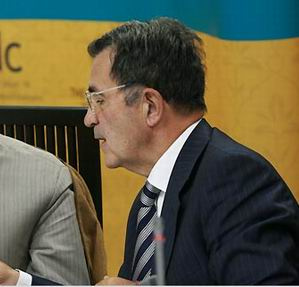We Need New Approach in Dialogue with Iran
The following is an exclusive interview with Romano Prodi, former Italian Prime Minister and former President of European Union Commission.

The following is an exclusive interview with Romano Prodi, former Italian Prime Minister and former President of European Union Commission.
Prodi was among prominent guests attending an international ‘Conference on Religion in the Modern World’ in Tehran (Oct. 13-14).
Q: It seems that Italy has kept silent vis-à-vis the Iranian crisis and the nuclear issue and is trying to avoid an open confrontation with IRI. What is exactly Italy’s stance on Iran?
A: No, I don’t agree with what you say. Of course, I have no intention to talk about the global stance vis-à-vis Iran because it is not my expertise and because right now I have no executive position. I really hope and wish that Iran and the international community could reach understanding on Iran-related issues, particularly the nuclear issue. In this respect, we need to adopt a new approach. I think Iran needs to send more and more messages to political authorities in the world to tell them it is not what they think it is. Iran is a great country, a genuine country with deep roots. We need to take big decisions to help both Iran and the international community and at the same time leave a positive impact on the type of their relations. This is what we need!
Q: What do you think about the global economic crisis that has blanketed the US and Europe?
A: As you know, the crisis that enveloped economic markets last week has made everyone worried in the world. The US and many other European and African governments tried to adopt appropriate solutions to reduce the dimensions of this crisis but the impacts of these measures have been different depending on their location. We really hope the crisis would not adversely affect growth in European and American states particularly in the area of economy and investment. We need to remain tranquil for several weeks so that we could find a suitable solution to save free global economy. The economic market is too complicated to make a quick and comprehensive decision to overcome the problem. We can find a more appropriate solution to the present day economic crisis with patience and vigilance.
Q: In the opinion of many experts and analysts the present economic crisis would have the most adverse impact on poor and African countries. How could we minimize the damage on the more vulnerable countries?
A: I was in Africa exactly when the crisis began in the US and Europe. The truth is that this situation can leave its negative impacts on the entire world. Of course, the extent of this impact on Africa would be less compared to Europe because African banks and stock exchanges are not as big as those in the US and Europe nor have they extensive communication with American and European markets. But this crisis would affect them anyway because most of the investments in Africa are done by Europeans. I stress that there are no potential reasons to prove that Africa has been directly affected by this crisis now. But as you know the global economies are interconnected because we need to remain in close contacts.

